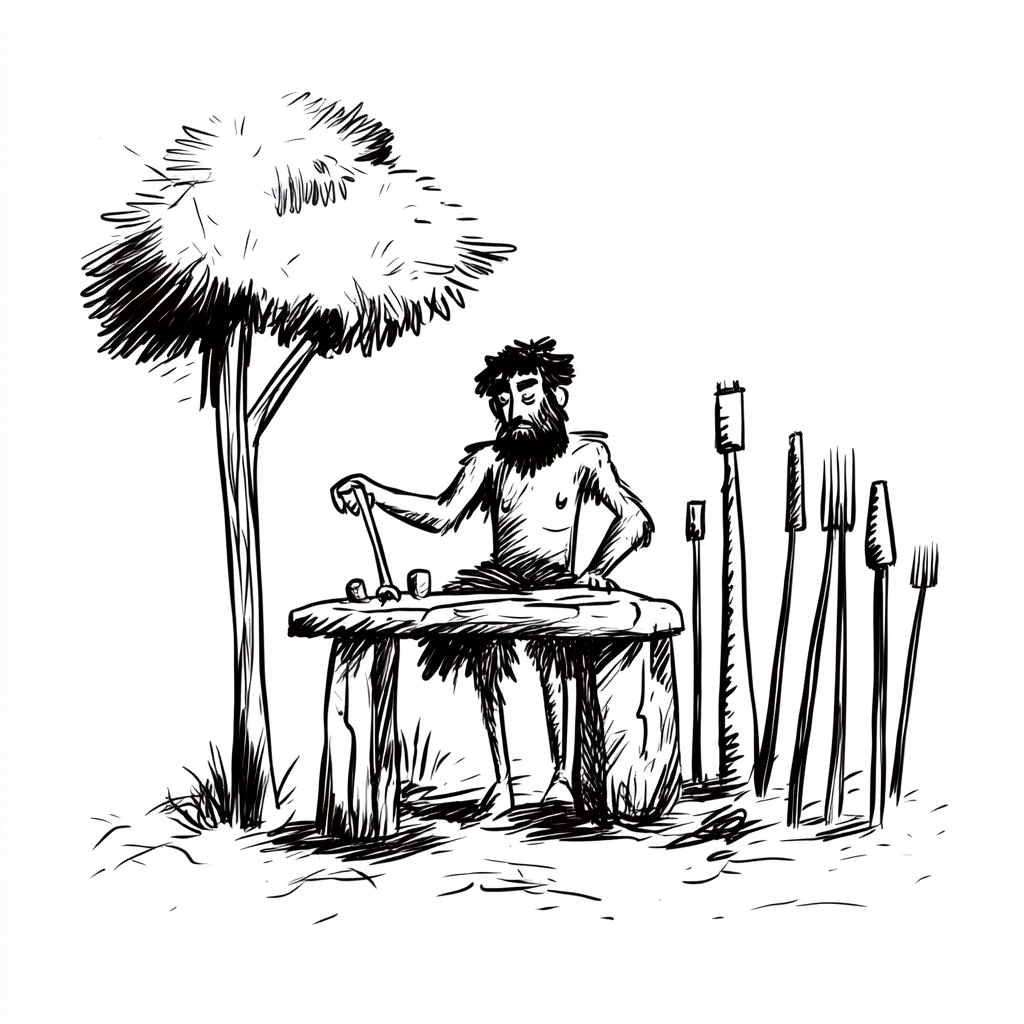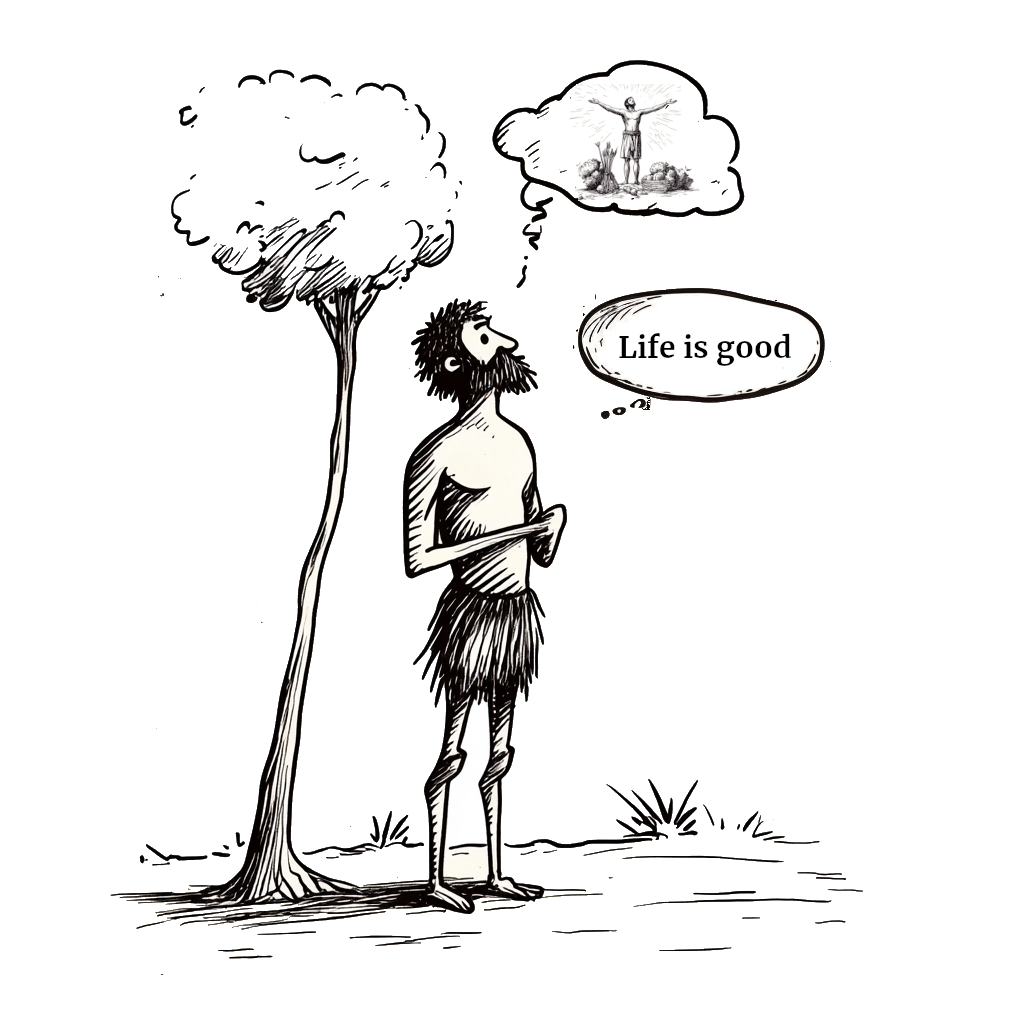Why Words Matter
How Language Shapes Our Lives
Imagine living in a world without words. Pretty tough, right? Words are all around us—they’re how we express our thoughts, feelings, and ideas. But have you ever thought about why words are so important and how they shape everything we do?
 Words
started out as simple sounds and gestures. Long ago, humans used
grunts and signals to point out things like food, danger, or shelter.
These were the earliest forms of language. Over time, people noticed
that some things shared common traits. For example, a tree is not just
this tree or that tree; it’s all trees—they’re tall, have branches,
leaves, and provide shade. By noticing these similarities, they
created the word "tree." This was a huge leap because it allowed them
to communicate, share information, and plan for the future. Words like
"tree" could tie into specific behaviors or experiences shared by a
whole group of similar things, but also allowed people to talk about
items not directly in front of them, like saying, "I want to find a
tree to rest under for shade."
Words
started out as simple sounds and gestures. Long ago, humans used
grunts and signals to point out things like food, danger, or shelter.
These were the earliest forms of language. Over time, people noticed
that some things shared common traits. For example, a tree is not just
this tree or that tree; it’s all trees—they’re tall, have branches,
leaves, and provide shade. By noticing these similarities, they
created the word "tree." This was a huge leap because it allowed them
to communicate, share information, and plan for the future. Words like
"tree" could tie into specific behaviors or experiences shared by a
whole group of similar things, but also allowed people to talk about
items not directly in front of them, like saying, "I want to find a
tree to rest under for shade."
Language didn’t just make life easier; it changed how they thought. When people used a word like “danger” to describe a situation, it helped them understand their surroundings better and make smarter choices. As people developed more words, they moved beyond just naming things. They started using words to describe more complex ideas, creating concepts—mental categories for things that share similar characteristics.
 Think about the word "tool." It’s not just a hammer or a knife; it can
be anything that helps you get a job done, whether it’s a pencil, a
laptop, or a pair of scissors. By grouping things into concepts, words
allow us to organize our thoughts and see the world in new ways. This
kind of thinking helped early humans build societies and work
together. Words also became the glue that held society together. When
people shared the same language, they could create rules, trade, and
form communities. For example, agreeing on what "fairness" means
helped them create systems everyone could follow. That’s why clear and
precise language is so important—it keeps us on the same page.
Think about the word "tool." It’s not just a hammer or a knife; it can
be anything that helps you get a job done, whether it’s a pencil, a
laptop, or a pair of scissors. By grouping things into concepts, words
allow us to organize our thoughts and see the world in new ways. This
kind of thinking helped early humans build societies and work
together. Words also became the glue that held society together. When
people shared the same language, they could create rules, trade, and
form communities. For example, agreeing on what "fairness" means
helped them create systems everyone could follow. That’s why clear and
precise language is so important—it keeps us on the same page.
But what happens when words lose their clear meanings? In today’s world, you’ve probably experienced conversations where people use words like "fairness," "freedom," or "justice," but everyone seems to have a different idea of what they mean. It can be frustrating, right? When words get used in different ways or are stretched to cover too many ideas, they become vague and confusing. It is a corruption of language. Imagine calling anything you can chew "food," even if it’s not nutritious. If people start calling plastic or rocks "food," it creates confusion and can even be dangerous. The same thing happens when words like "freedom" or "equality" are used in unclear or misleading ways.
 This misuse of language can lead to misunderstandings, conflicts, and
breakdowns in communication. If we can't agree on what words mean,
it’s hard to work together and make decisions that reflect what we
actually want. Now, imagine a society where words have lost their
connection to reality. People use terms like "success" or "fairness"
without agreeing on what they mean. Debates go in circles, arguments
get heated, and cooperation breaks down. If you think about school
debates or online discussions, it’s easy to see how frustrating it can
be when people can't agree on the meanings of key terms. Instead of
bringing us together, unclear words drive us apart.
This misuse of language can lead to misunderstandings, conflicts, and
breakdowns in communication. If we can't agree on what words mean,
it’s hard to work together and make decisions that reflect what we
actually want. Now, imagine a society where words have lost their
connection to reality. People use terms like "success" or "fairness"
without agreeing on what they mean. Debates go in circles, arguments
get heated, and cooperation breaks down. If you think about school
debates or online discussions, it’s easy to see how frustrating it can
be when people can't agree on the meanings of key terms. Instead of
bringing us together, unclear words drive us apart.
Computer - 1640s, "one who calculates, a reckoner, one whose occupation is to make arithmetical calculations," agent noun from compute (v.). - Etymonline.com Words change over time. New words pop up, and old ones take on new meanings. Take the word "computer," for example. It used to mean a person who did calculations. Today, it means an electronic device we use every day. Even though the word's meaning changed, it still points to the essential idea of something that processes information. When words evolve, they need to stay connected to their original meanings. If they don't, they can become vague and lose their power. The word "tool," for instance, now includes everything from hammers to smartphones, but it still keeps its core meaning: something that helps you get things done.
So, how can you make sure you’re using language in a way that makes sense and helps others understand you? Here are some simple tips:
- Define Your Terms: When you’re discussing complex topics, like in a debate or essay, make sure to explain what you mean by key terms. For example, if you’re talking about "fairness," be clear about what you think is fair.
- Use Words with Precision: Avoid using vague words that could mean many different things. Be specific about what you’re describing. Instead of saying "It’s unfair," try explaining why it’s unfair.
- Ask for Clarification: If someone uses a word in a way that seems unclear, ask them what they mean. This can help avoid misunderstandings and make the conversation more productive.
- Think About What Words Represent: When you use a word, think about what it actually represents in the real world. If a word like "freedom" means different things to different people, try to find a more precise way to describe what you’re talking about.
 Understanding and using language clearly is a skill that will help you
throughout your life. Whether you’re debating in work/school, writing
essays, posting on social media, or just having conversations with
family/friends, using words effectively can make your communication clearer
and more impactful. Words aren’t just sounds or scribbles on paper.
They’re tools that help us think, connect, and make sense of the
world. When we use them well, they can help us build relationships,
solve problems, and create a better future.
Understanding and using language clearly is a skill that will help you
throughout your life. Whether you’re debating in work/school, writing
essays, posting on social media, or just having conversations with
family/friends, using words effectively can make your communication clearer
and more impactful. Words aren’t just sounds or scribbles on paper.
They’re tools that help us think, connect, and make sense of the
world. When we use them well, they can help us build relationships,
solve problems, and create a better future.
"Definitions are the guardians of rationality, the first line of defense against the chaos of mental disintegration."